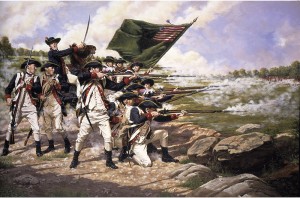Precursors to the 1776 Declaration of Independence
Scores of state and local declarations of independence were written between April and July 1776 before Declaration of Independence. By and large, it still goes unappreciated how much they informed the July 4, 1776 document, which derived may of its claims from these various and sundry declarations. It also goes to show that our Declaration of Independence was not written in a vacuum, but was in many ways almost a logical next step that emerged from all of the cries for greater freedom from states and localities.
The more one reads the many local declarations that preceded the July 4, 1776 declaration, the more apparent it becomes, as Jefferson said late in life in a letter to Henry Lee, that the Declaration of Independence truly was not in any way a statement of “new principles, or new arguments, never before thought of;” rather, it was, “an expression of the American mind,” in many ways a distillation of the declarations that preceded it.
We currently have the following declarations archived which are precursors to the 1776 Declaration of Independence:
Instructions for Independence, Acton, Massachusetts (June 14, 1776)
Editor’s note: On June 14, 1776, inhabitants of the town of Acton, in Middlesex County, Massachusetts, apparently left out of an earlier opportunity “to express

Declaration to Become an Independent State, Murrayfield, Mass. (June 17, 1776)
Editor’s Note: The picture of brevity, this declaration by the inhabitants of the town of Murrayfield, in Hampshire County, Massachusetts, makes clear that they cast

Town of Malden, Massachusetts, Instructions for a Declaration of Independence (May 27, 1776)
Editor’s note: A little over a month before the heady day of July 4, 1776, no longer interested in trying to patch things up with

Declaration for Independence by the Inhabitants of Alford, Mass. — June 7, 1776
Editor’s note: This is what one might call a conditional declaration of independence — if the Second Continental Congress decides to sever ties with Britain,

Recommendation for Independence by Scituate, MA, residents
Editor’s note: A month before the July 4, 1776 Declaration of Independence was penned, the residents of this seacoast town in Massachusetts called upon the

Instructions for Independence by the Inhabitants of Palmer, Hampshire County, MA (June 17, 1776)
Editor’s note: What with Britain “being bent on her favourite scheme of enslaving the Colonies,” the inhabitants of this Massachusetts town, on June 17, 1776,

Address of a Watchman to the People of Pennsylvania, on a Declaration of Independence (June 24, 1776)
Editor’s note: In this eloquent and insightful missive of June 24, 1776, a Pennsylvania watchman — typically someone who keeps lookout in a town at night —
New Hampshire Declaration of Independence (June 15, 1776)
Editor’s Note: With the inauspicious title of “Committee,” New Hampshire’s chambers declared independence “with the example of several of the most respectable of our sister Colonies

Talbot County, Maryland, Instructions for Independence (June 7, 1776)
Editor’s Note: If ever there was a declaration that shows how sentiments for independence at the most local level can drive its state delegates to

Anne Arundel County, MD, Resolves of Independence (June 22, 1776)
Editor’s Note: Describing themselves as ‘Associators’ (which brings to mind the sundry clusters of voluntary associations that banded together in the years preceding the march toward revolution

Charles County, MD, declaration to declare independence (June 1776)
Editor’s Note: A first glance at the grievances enumerated here, and the language and tone in which they are presented, and you might think that

Declaration of Independence – Town of Wrentham, Mass. (June 5, 1776)
Editor’s Note: This eloquent declaration was issued by the denizens of Wrentham, MA, who possessed a “zeal for the common rights of mankind,” and were dismayed

